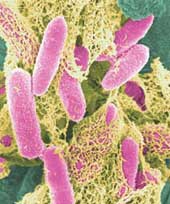March 10th, 2011 by RyanDuBosar in Better Health Network, Health Tips
No Comments »

 For those of you planning air travel to your next medical conference (and ACP Internist isn’t too shameless to plug Internal Medicine 2011 — we hope to see you there), TIME reports that there are five health risks that are rare yet have recently happened. Tips on avoiding these maladies include:
For those of you planning air travel to your next medical conference (and ACP Internist isn’t too shameless to plug Internal Medicine 2011 — we hope to see you there), TIME reports that there are five health risks that are rare yet have recently happened. Tips on avoiding these maladies include:
— E. Coli and MRSA on the tray table. Microbiologists found these two everywhere when they swabbed down flights. Bring your own disinfecting wipes.
— Bedbugs in the seat. British Airways fumigated two planes after a passenger posted pictures online about her experience. Wrap clothes in plastic and wash them.
— Sick seatmates. Everyone has experienced (or been) this person. Wash your hands.
— Deep vein thrombosis (DVT). Tennis star Serena Williams experienced a pulmonary embolism, possibly related to recent foot surgery. But DVT can happen to anyone restrained to a cramped position for long periods of time. Move around in-flight (but not during the beverage service, of course.)
— Dehydration. Dry cabin air may make it more difficult to fight off infections. Drink more water.
*This blog post was originally published at ACP Internist*
March 6th, 2011 by Paul Auerbach, M.D. in Better Health Network, Health Tips
No Comments »

 This is a guest post by Dr. Erik McLaughlin.
This is a guest post by Dr. Erik McLaughlin.
**********
Traveler’s Diarrhea: The Basics
Known around the world by many names including “Montezuma’s revenge,” “Delhi belly” and “mummy tummy,” traveler’s diarrhea (TD) is the most common illness faced by travelers. Nothing can slow down a fun trip as easily as TD — and it can also have serious health implications. TD typically lasts four to six days, and 90 percent of cases occur within the first two weeks of travel.
Anatomy You Need to Know
The gastrointestinal tract starts at the mouth and ends at the anus. After food enters the mouth, it passes through the esophagus to the stomach, where it sits for approximately 45 minutes. After being broken down by gastric secretions, food matter enters the small intestine (duodenum, jejunum, and ileum in order). The small intestine is the site where most nutrients are absorbed by the body. From the small intestine, food matter begins to look more like feces as it progresses to the large intestine or colon. The colon absorbs water from the food material before the material passes through the anus and exits the body as feces.
Symptoms
Recognizing the warning signs of TD, such as blood in the stool, fever, or abdominal cramping, can help a savvy traveler know when to seek medical help.
TD has many definitions; the presence of three or more loose-formed stools in one day is a good one. Abdominal cramping, nausea, vomiting and fever may also occur. The presence of blood in the stool can indicate that infection has directly damaged the intestinal wall and should be taken seriously. Read more »
This post, Traveler’s Diarrhea: The Basics, was originally published on
Healthine.com by Paul Auerbach, M.D..
November 26th, 2010 by RyanDuBosar in Better Health Network, Health Policy, News
No Comments »

Potential health effects of airport security are being questioned for their possible health consequences, from spreading germs to radiation exposure to the stress that being searched induces.
With cheaper flights available this year and the need for security in air travel, the Transportation Security Administration (TSA) is justifying its full body scans and its pat-downs that rise up travelers’ legs — all the way up.
The scanners use microwaves, leading some to question whether people may be receiving too much radiation. It’s also a concern to activists who may have already undergone a lot of radiation for existing condition, or who have other conditions for which TSA agents may not be trained. (Read one seasoned traveler’s personal experience here.) The TSA reports the scanners expose users less energy than a cell phone.
Some protesters refused the body scans in favor of a pat-down, in an effort to tie up air travel on the day before Thanksgiving and force a review on the issue. But a manual exam spreads germs, say others.
Amid all the speculation of potential health consequences, federal officials are reminding travelers that the security measures are there for passenger safety. However, retorts Jason Mustian‘s Twitter feed, “Body scans and genital fondlings would save more lives if our government was paying to have them done in hospitals rather than airports.”
*This blog post was originally published at ACP Internist*
 For those of you planning air travel to your next medical conference (and ACP Internist isn’t too shameless to plug Internal Medicine 2011 — we hope to see you there), TIME reports that there are five health risks that are rare yet have recently happened. Tips on avoiding these maladies include:
For those of you planning air travel to your next medical conference (and ACP Internist isn’t too shameless to plug Internal Medicine 2011 — we hope to see you there), TIME reports that there are five health risks that are rare yet have recently happened. Tips on avoiding these maladies include:












